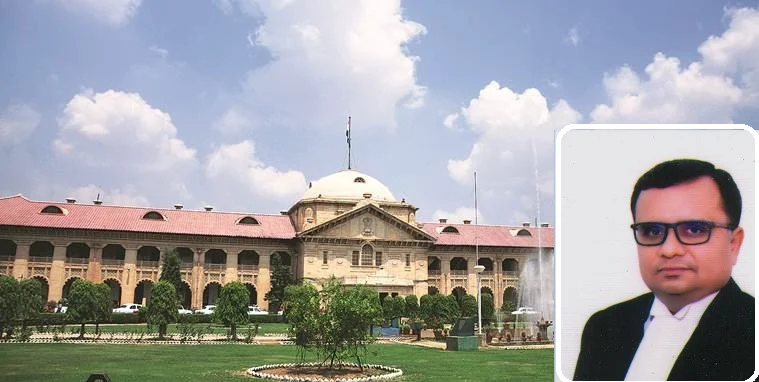News Prism, Delhi Desk
NEW DELHI : Comments made by Justice Rohit Ranjan Agarwal of the Allahabad High Court regarding religious conversion have sparked widespread criticism and concern among Christian leaders and activists across India.
Justice Agarwal’s remarks came in the context of denying bail to Kailash, accused in a case involving alleged conversion from Hinduism to Christianity. The judge expressed apprehensions about the demographic impact of continued conversions, calling for a halt to religious congregations facilitating such conversations. The bail application was rejected on July 1, 2024.
During the hearing, Justice Agarwal stated, “If this process of conversion is allowed to be carried out, the majority population of this country would be in minority one day, and such religious congregation should be immediately stopped where the conversion is taking place and changing religion of citizen of India.”
The judge further observes, “Article 25 of the Constitution, which guarantees freedom of religion, does not provide for religious conversion. The word ‘Propagation’ means to promote, but it does not mean to convert any person from his religion to another religion.”
Christian Leaders React
Christian leaders swiftly condemned the Allahabad High Court’s statements, characterizing them as biased and potentially incendiary. A.C. Michael, President of the Federation of Catholic Associations of Archdiocese of Delhi (FCAAD) and national coordinator of the United Christian Forum (UCF), criticized the court’s remarks as “saffron-tinged,” implying a bias against Christians.
Michael, a former member of the Delhi Minorities Commission, emphasized that Christians are equal citizens under Indian law and deserve protection against discrimination. He argued that judicial decisions should focus solely on legal merits rather than making sweeping statements about religious communities.
The UCF echoed these sentiments, expressing deep anguish over the court’s observations. They highlighted constitutional guarantees under Article 25, which safeguard an individual’s right to freely practice and propagate their religion. The organization raised concerns about potential repercussions for the Christian community, citing instances of violence and harassment reported in states like Uttar Pradesh and Chhattisgarh.
Legal and Social Backlash
Social media and civil society responses were equally critical. Dr. John Dayal, a prominent Christian activist, drew parallels to Islamophobia, calling for corrective action from the judiciary. He highlighted concerns over the fair treatment of religious minorities in bail proceedings, referencing previous judicial decisions that have sparked controversy.
Legal experts weighed in on the constitutional implications of Justice Agarwal’s remarks. Dr. Rohan, a legal scholar, criticized the judge’s interpretation of religious freedoms, arguing that it misrepresented constitutional protections.
The controversy reignited debates over judicial neutrality and the role of courts in safeguarding fundamental rights. Critics accused Justice Agarwal of judicial overreach, suggesting that his comments exceeded the scope of legal deliberation.
Case Details and Allegations
The Indiatomorrow.net reports, the case involving Kailash revolves around allegations of facilitating conversions through religious gatherings. The complaint was filed by Ramkali Prajapati, who claimed that her brother, Ramphal, had not returned from a gathering in Delhi purportedly organized for religious conversion.
During the bail hearing, Kailash’s counsel, Advocate Saket Jaiswal, argued that attending a religious gathering did not equate to forced conversion. He pointed out inconsistencies in the prosecution’s claims and cited a previous bail granted to another accused, Sonu Paster, in the same case.
On the opposing side, Uttar Pradesh’s Additional Advocate General PK Giri alleged widespread conversions occurring at such events, claiming organizers received substantial financial incentives.
Broader Impact and Concerns
The broader implications of Justice Agarwal’s remarks raised alarms about judicial impartiality and the protection of minority rights in India. Critics accused the judiciary of adopting a majoritarian stance, potentially undermining religious freedoms guaranteed under the Constitution. Experts and demographers dismissed fears of demographic shifts due to conversions as unsubstantiated. They argued that such concerns lacked empirical basis and could fuel societal tensions unnecessarily.
Public Reactions
Public reactions reflected a spectrum of opinions. Professor Katharine Adeney of the University of Nottingham dismissed demographic fears as unfounded, citing India’s predominant Hindu population. She criticized the judge’s statements as lacking factual basis.
Clifton D’ Rozario, a leader of the Communist Party of India (Marxist-Leninist) Liberation, condemned what he described as judicial majoritarianism, emphasizing the right of individuals to choose their religion freely.
Calls for Judicial Reform
In response to the controversy, calls for judicial restraint and reform resonated across legal circles and civil society. The United Christian Forum called for a retraction of the sweeping allegations made against the Christian community in Justice Agarwal’s order. They underscored the potential for such remarks to exacerbate discrimination and violence against religious minorities.
The controversy underscores broader challenges facing the judiciary in maintaining impartiality and upholding constitutional protections in matters of religion. As debates continue, the role of the judiciary in safeguarding minority rights and fostering communal harmony remains a critical issue. The outcome of this case and the response from legal authorities will likely influence future judicial decisions and public perceptions regarding religious freedoms in India.

